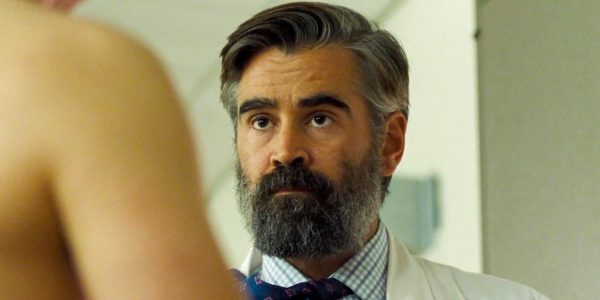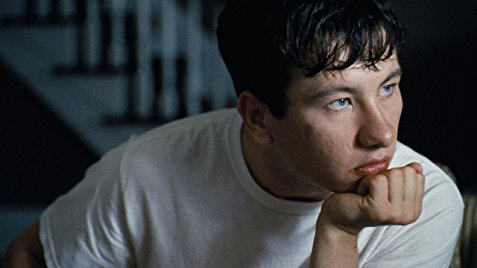The Killing of a Sacred Deer Review
"A repulsive journey into the dark side of the human soul"
'Tell me who your enemy is, and I will tell you who you are.' - Carl Schmitt
The journey through the human experience tends to come back to the notion of justice. It is as simple as everyday conversations in the form of throwaway lines like,
‘That isn’t fair’ or
‘How can people get away with that?’ We can speculate on how to address these universally challenging subjects, but most of the time the answers are less than satisfying. What if a family member dies on the operating table and it comes to light it was due to the negligence of a doctor? After being investigated, the doctor is not held to account for his actions, what would you do? These queries boil under the surface of this disturbing character analysis from writer/director Yorgos Lanthimos
(The Lobster).

Even though Dr Steven Murphy
(Colin Farrell) leads a hectic life as a cardiovascular surgeon, he takes time out of his schedule to support Martin
(Barry Keoghan), a teen who lost his father in a tragic accident. Unbeknownst to his wife
(Nicole Kidman) and children, he meets with the young man over a meal just to chat. Eventually, Steven introduces Martin to his family and after winning them over things begin to go wrong within the Murphy household. Both of the Murphy children fall ill to an unknown ailment, and while they are in the hospital, Martin shares that he is behind their sickness and that it is payback for the respected doctor's past and this is the price for his transgressions.
The difference between a traditional horror/revenge film and a Lanthimos' project is the alarming elements that extend beyond the mere threat to human life. There is no knife-wielding psycho or a villain with a handlebar moustache to despise, but the horrific reality that the enemy is within man’s own heart. This film will get under the skin of all who manage to stomach the philosophical and moral quagmire that it represents, but it does forcefully open the door on the state of the human soul.

Colin Farrell and Nicole Kidman are astonishingly emotionless, but their roles are compelling as people who seem to have lost the zest for life. Something that all marriages and families experience in various degrees. These plasticine characters show that despite all they have in the world, everything in their world is lifeless. Then when confronted with the horrific choices of the storyline, they move from a comatose existence to being forced into truly living. Being faced with their past sins and the need for restitution becomes a soul-searching metaphorical heart surgery. The exposure within the distressing inventiveness of the script and the performances are the desperate state of mankind’s situation on this earth. This is supported by the intentionally understated, but cleverly ominous performance of Barry Keoghan. He holds his own against the seasoned veteran actors and is one of the best villains in cinema this year. The reason it is exceptionally repulsive isn’t due to graphic violence or disturbing visuals, but how close it cuts to the harsh realities of life.
From an actual open heart surgery in the opening sequence, the
metaphorical foreshadowing is not lost in how the Greek director is going to expose humanity’s inner workings. There is brilliance in this concept and methodical application of each aspect of the film, but
The Killing of a Sacred Deer is impossible to enjoy.
Pros
- Disturbingly brilliant concept
- Strong, but stoic performances from the lead actors
- Understated but fascinating depiction by Barry Keoghan
Cons
- The decision to kill a child is abhorrent
- Very little to enjoy within the experience of this film
 Even though Dr Steven Murphy (Colin Farrell) leads a hectic life as a cardiovascular surgeon, he takes time out of his schedule to support Martin (Barry Keoghan), a teen who lost his father in a tragic accident. Unbeknownst to his wife (Nicole Kidman) and children, he meets with the young man over a meal just to chat. Eventually, Steven introduces Martin to his family and after winning them over things begin to go wrong within the Murphy household. Both of the Murphy children fall ill to an unknown ailment, and while they are in the hospital, Martin shares that he is behind their sickness and that it is payback for the respected doctor's past and this is the price for his transgressions.
The difference between a traditional horror/revenge film and a Lanthimos' project is the alarming elements that extend beyond the mere threat to human life. There is no knife-wielding psycho or a villain with a handlebar moustache to despise, but the horrific reality that the enemy is within man’s own heart. This film will get under the skin of all who manage to stomach the philosophical and moral quagmire that it represents, but it does forcefully open the door on the state of the human soul.
Even though Dr Steven Murphy (Colin Farrell) leads a hectic life as a cardiovascular surgeon, he takes time out of his schedule to support Martin (Barry Keoghan), a teen who lost his father in a tragic accident. Unbeknownst to his wife (Nicole Kidman) and children, he meets with the young man over a meal just to chat. Eventually, Steven introduces Martin to his family and after winning them over things begin to go wrong within the Murphy household. Both of the Murphy children fall ill to an unknown ailment, and while they are in the hospital, Martin shares that he is behind their sickness and that it is payback for the respected doctor's past and this is the price for his transgressions.
The difference between a traditional horror/revenge film and a Lanthimos' project is the alarming elements that extend beyond the mere threat to human life. There is no knife-wielding psycho or a villain with a handlebar moustache to despise, but the horrific reality that the enemy is within man’s own heart. This film will get under the skin of all who manage to stomach the philosophical and moral quagmire that it represents, but it does forcefully open the door on the state of the human soul.
 Colin Farrell and Nicole Kidman are astonishingly emotionless, but their roles are compelling as people who seem to have lost the zest for life. Something that all marriages and families experience in various degrees. These plasticine characters show that despite all they have in the world, everything in their world is lifeless. Then when confronted with the horrific choices of the storyline, they move from a comatose existence to being forced into truly living. Being faced with their past sins and the need for restitution becomes a soul-searching metaphorical heart surgery. The exposure within the distressing inventiveness of the script and the performances are the desperate state of mankind’s situation on this earth. This is supported by the intentionally understated, but cleverly ominous performance of Barry Keoghan. He holds his own against the seasoned veteran actors and is one of the best villains in cinema this year. The reason it is exceptionally repulsive isn’t due to graphic violence or disturbing visuals, but how close it cuts to the harsh realities of life.
From an actual open heart surgery in the opening sequence, the metaphorical foreshadowing is not lost in how the Greek director is going to expose humanity’s inner workings. There is brilliance in this concept and methodical application of each aspect of the film, but The Killing of a Sacred Deer is impossible to enjoy.
Colin Farrell and Nicole Kidman are astonishingly emotionless, but their roles are compelling as people who seem to have lost the zest for life. Something that all marriages and families experience in various degrees. These plasticine characters show that despite all they have in the world, everything in their world is lifeless. Then when confronted with the horrific choices of the storyline, they move from a comatose existence to being forced into truly living. Being faced with their past sins and the need for restitution becomes a soul-searching metaphorical heart surgery. The exposure within the distressing inventiveness of the script and the performances are the desperate state of mankind’s situation on this earth. This is supported by the intentionally understated, but cleverly ominous performance of Barry Keoghan. He holds his own against the seasoned veteran actors and is one of the best villains in cinema this year. The reason it is exceptionally repulsive isn’t due to graphic violence or disturbing visuals, but how close it cuts to the harsh realities of life.
From an actual open heart surgery in the opening sequence, the metaphorical foreshadowing is not lost in how the Greek director is going to expose humanity’s inner workings. There is brilliance in this concept and methodical application of each aspect of the film, but The Killing of a Sacred Deer is impossible to enjoy.